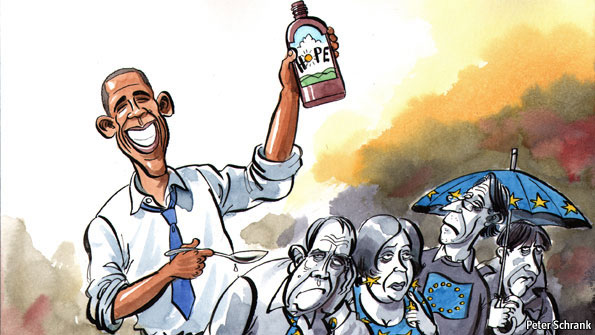
From Charlemagne, the Economist: Mr Obama’s tour comes when the two sides of the Atlantic are contending with the effects of the most acute economic crisis in eight decades. Both halves of the “West” are losing dominance, but the decline feels sharper in Europe. If Europeans once thought they could sacrifice some growth for the sake of more equality than America, many now fear they are being left behind, not just by America, but by new, rising powers. Fragmented into small and medium-sized states, many Europeans feel more exposed to global competition. But their effort to band together in the European Union is under strain. The crisis has exposed the weaknesses of the euro, immigration is challenging the system of open borders and rising Euroscepticism is questioning the very justification for the union. The war in Libya shows how badly even the most martial European states need America’s help.
“At times I feel like a therapist,” says one American official. “I keep having to tell Europeans that things are not so bad.” Indeed, the European ideal sometimes seems more alive in parts of Washington than in European capitals. The Obama administration has repeatedly prodded Europeans to shore up the euro. Hillary Clinton, the American secretary of state, is the biggest believer in the EU’s new but much-criticised diplomatic service.
The economic threat should be spurring America and Europeans to closer co-operation. At the height of the crisis they and others acted to stimulate their economies and save their banks. But now each country must cope with the resulting debts largely on its own (though those near collapse have been rescued). (graphic: Peter Schrank/Economist)
Image: economist%206%202%2011%20Obama%20Europe%20trip%20hope.jpg
